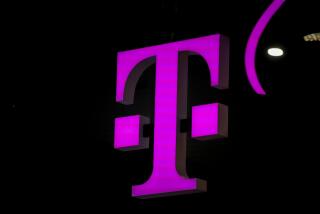Mexico Chooses Lead Buyer for Its Phone System : Telecommunications: A consortium led by St. Louis-based Southwestern Bell will pay $1.756-billion for the controlling interest. It’s part of Mexican privatization.
- Share via
MEXICO CITY — An international consortium that includes Southwestern Bell has won the bidding for the Mexican government’s controlling interest in this country’s national telephone company with a $1.756-billion offer, the government announced Sunday.
St. Louis-based Southwestern Bell and its partners, which include France Telecom and Mexican financier Carlos Slim’s Grupo Carso, will receive 20.4% of the stock in Telefonos de Mexico, a company expected to have $3.5 billion in revenue this year despite a reputation for poor service.
A complex financial structure gives the consortium 51% of the voting stock in the company, known as Telmex. The government plans to sell its non-voting stock--with an estimated value of $3 billion--on international markets over the next year, completing Latin America’s largest privatization of a state-owned company.
About 20% of the company’s stock already trades on the U.S. over-the-counter market. The rest trades on the Mexican Stock Exchange.
The bid was about $124 million more than the value of the stock at current market prices. However, Telmex General Director Alfredo Barranda last week told a group of foreign correspondents that “the 20.4% is worth more because it gives (the owner) control of the company.”
The winning bidders beat out a consortium of GTE, Telefonica de Espana and Roberto Hernandez, another well-known Mexican investor. A group of businessmen from the northern industrial town of Monterrey also had bid. Their offer had been given little chance of success because they lacked a foreign partner to provide technology.
Barranda also had said the choice of a winner would be based as much on the investment and technology programs presented as on the price. However, a Finance Ministry spokesman said all the technology programs were satisfactory and that the winner was chosen solely on the basis of price.
Stock analysts said the Southwestern Bell group’s bid was contingent on the U.S. company receiving an amendment to the court order that broke up the Bell System. That order forbade the resulting Baby Bell regional telephone companies, including Southwestern Bell, from competing against American Telephone & Telegraph in long-distance service.
Long-distance calling between the United States and Mexico has historically been one of the most profitable parts of Telmex’s business.
The sale of the government’s interest in Telmex is the latest step in an eight-year privatization drive that has resulted in the sale or closure of hundreds of state-owned corporations.
Barranda acknowledged that the government has skimped on investment in Telmex, using the company’s huge profits to help finance the federal deficit.
In part for that reason, Mexico has only about 5.5 lines per 100 inhabitants, while other countries at similar levels of development have about 20 per 100.
“It is a company that has huge backlogs and that assures its growth,” Barranda said.
Since plans to sell the company were announced in September, 1989, the government has been dressing up Telmex, restructuring its debt, increasing the number of its lines by 13%, contracting for a fiber optics network and retraining many of the company’s 50,000 workers, most of them unionized.
Still, the government admits, another $10 billion worth of investment will be needed to bring the company up to international standards. However, much of that money can be generated internally now that the formerly onerous taxes on telephone service have been removed, analysts said.
To assure that those investments are made, the government has come up with a plan to allow Telmex to cut its taxes by 20%, as long as the money saved is invested.
More to Read
Sign up for Essential California
The most important California stories and recommendations in your inbox every morning.
You may occasionally receive promotional content from the Los Angeles Times.













